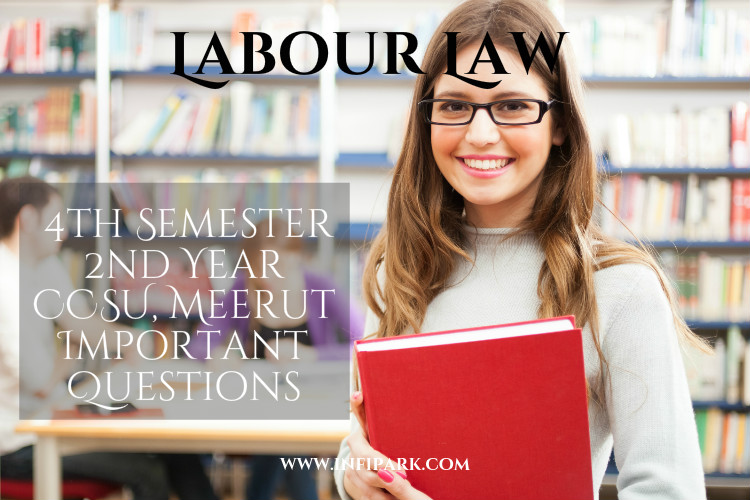Q.1. Explain in brief the objects and characteristics of Industrial Dispute Act, 1947.
Q.2. Explain the following terms under the Industrial Disputes Act, 1947.
Q3. What is the definition of “Industrial Dispute” under Industrial Dispute Act, 1947? When does it arise? When does an ‘Individual dispute’ become an Industrial Dispute’?
Or
Whether the followings comes under the definition of Industrial disputes or not? – .
(i) A dispute between a single workman and his employer.
(ii) A dispute between it dismissed employee and his employer.
Q.4. What are the various authorities under the Industrial dispute Act 1947? Discuss the constitution and function of the authorities.
Or
Discuss machineries does the Industrial Disputes Act, 1947 provide for the settlement of the Industrial Disputes. Are these measures sufficient in your opinion in the direction of achieving the aim?
Q.5. Examine the constitution, powers and functions of the Board of Conciliation constituted under the Industrial Disputes Act, 1947. Discuss the consequences does if the Board fails to reach any conciliation.
Q.6. Write short notes on the following under the Industrial Dispute Act, 1947.
1. Award
2. Controlled Industry
3. Industry
4. Tribunal
5. Wages
6. Continuous Service
7. Lock Out
8. Closure
9. Court
10. Strike
11. Unfair Labour Practice
12. Work
13. Lay off
14. Appropriate Government
Q.7a). Discuss the constitution and functions of the Labour court constituted under the provisions of the Industrial Disputes Act, 1947.
Q.7b). States the constitution and function of National Tribunal as provided under the industrial disputes Act, 1947.
Q.7c). What do you mean by an award? When does an Award become enforceable whom awards in a Industrial dispute proceeding?
Q.7d) What do you mean by strike? When a strike in an industrial establishment othe than public utility service is illegal?
Or
What is Strike? How are strikes permissible under the Industrial Disputes Act, 1947? Distinguish it from lock-out.
Q.8a). Examine, whether strike by workers and lock-out by employers are the fundamental rights granted by the Constitution?
Q.8b). What do you mean by lock-out when and under what circumstances a lock-out shall be illegal? Distinguish it from
Q.8c). What do you mean by lay-off? What are the rights of a laid-off workman to claim compensation? Under what circumstances a workman is not entitled to receive compensation for lay-off ?
Q.8d). What do you understand by Retrenchment? Discuss the condition precident to retrenchment and procedure for retrenchment under Industrial Disputes Act, 1947.
Q.9a). Explain the “Unfair Labour Practice” and discuss the law relating to the unfair labour practice as provided in the Industrial
Q.9b). What do you mean by the term ‘Trade Union?’ Who are disqualified to be the member and office-bearer of the registered Trade Union? Can an outsider be an office-bearer of a registered Trade Union
Q.9c). “In a welfare State, Social interests have top priority.”
Q.10a). Discuss the requirements and procedure for registration of a Trade Union under the Trade Unions Act.
Or
Explain the procedure for registration of a Trade Union. What are the duties of Registrar while considering the application for Registration of a Trade Union.
Or
Discuss the provisions of the Trade Unions Act relating to registration of a Trade Union. What is the remedy if registration is refused to Union? Can registration be cancelled?
Q.10b). Discuss the rights and liabilities of a registered Trade
Q.10c). What are the objects on which the objects on which the general funds of a Trade Union may be spent? .
Q.10d). Discuss the items upon which the political fund may be spent?
Or
How the political fund may be collected? How can it be used ?
Q.11. Explain the procedure for the registeration of a Trade Union.
(b) Discuss the grounds on which registeration of a Trade Union can be withdrawn or cancelled by theRegistrar of Trade Union ?
(c) What are the remedies available to an aggrieved party if registeration is refused?
Q.12a). Discuss the rights, liabilities and duties of the Registered Trade Unions under the Trade Unions Act, 1926.
Q.12b). Discuss the privileges and immunities granted to Registered Trade Union under Trade Unions Act.
Or
Discuss the extent to which a Trade Union is exempted from
Q.12c). Discuss the law relating to change of name, amalgamation and dissolution of Trade Union
Q.13a). Explain the object of Payment of Wages Act, 1936 ? What is the meaning of the term “wages” under this Act.
Or
‘The payment of Wages Act was enacted for the purpose to provide that the employed person shall be paid their wages in a particular form and at a regular intervals without any unauthorized deductions’. Discuss.
Q.13b). Discuss fully the main provisions of “payment of Wages
Q.14. Explain the various responsibilities of an employer under the Payment of Wages Act. What provision does this Act contain to compel the employer to perform his obligations properly?
Q.15. Explain the power and functions of an inspector appointed under the Payment of Wages Act, 1936.
Q.16. State the law in relation to “penalties” under the payment of WagesAct, 1936
Q.17. State the object and salient features of the Minimum Wages
Q.18. Explain and distinguish between linimum Wage” “Fair Wage” and “Living Wage”. What is the procedure and principles for fixation and revision of the minimum rates of wages? Is the financial capacity of the employer to pay minimum wages a necessary condition for its
Q.19. Discuss the remedy available to the worker who has been paid less than the minimum rates of wages. Who can be appointed as authority to decide claims under the Act?
Q.20. Discuss the concept of wages under the Payment of Wages Act, 1936. What is deduction? What deductions are, lawfully be made by the employer from the wages of the employee?
(b) Discuss the remedies which are available to an employee against the employer who has made illegal deductions from his wages.








